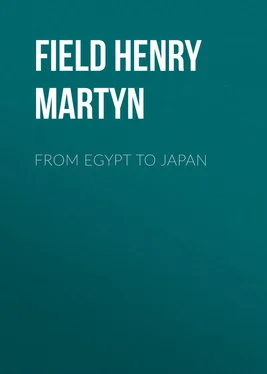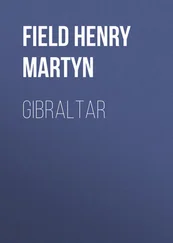Henry Field - From Egypt to Japan
Здесь есть возможность читать онлайн «Henry Field - From Egypt to Japan» — ознакомительный отрывок электронной книги совершенно бесплатно, а после прочтения отрывка купить полную версию. В некоторых случаях можно слушать аудио, скачать через торрент в формате fb2 и присутствует краткое содержание. Жанр: foreign_antique, foreign_prose, Путешествия и география, на английском языке. Описание произведения, (предисловие) а так же отзывы посетителей доступны на портале библиотеки ЛибКат.
- Название:From Egypt to Japan
- Автор:
- Жанр:
- Год:неизвестен
- ISBN:нет данных
- Рейтинг книги:3 / 5. Голосов: 1
-
Избранное:Добавить в избранное
- Отзывы:
-
Ваша оценка:
- 60
- 1
- 2
- 3
- 4
- 5
From Egypt to Japan: краткое содержание, описание и аннотация
Предлагаем к чтению аннотацию, описание, краткое содержание или предисловие (зависит от того, что написал сам автор книги «From Egypt to Japan»). Если вы не нашли необходимую информацию о книге — напишите в комментариях, мы постараемся отыскать её.
From Egypt to Japan — читать онлайн ознакомительный отрывок
Ниже представлен текст книги, разбитый по страницам. Система сохранения места последней прочитанной страницы, позволяет с удобством читать онлайн бесплатно книгу «From Egypt to Japan», без необходимости каждый раз заново искать на чём Вы остановились. Поставьте закладку, и сможете в любой момент перейти на страницу, на которой закончили чтение.
Интервал:
Закладка:
In the King's tomb, or sepulchral chamber, a room some forty feet square, hollowed out of the solid rock, the vaulted roof is supported by Doric pillars, which shows that the Greeks obtained many of their ideas of architecture in Egypt, as well as of philosophy and religion.
As we continue our course up the river, we observe more closely the features of the valley of the Nile. It is very narrow and is abruptly bounded by barren and ragged mountains. Between these barriers the river winds like a serpent from side to side, now to the east, and now to the west, but inclining more to the range of Eastern or Arabian hills, leaving the greater breadth of fertility on the western bank. Here is the larger number of villages; here is the railroad which the Khedive has built along the valley, beside which runs the long line of telegraph poles, that sign of civilization, keeping pace with the iron track, and passing beyond it, carrying the electric cord to the upper Nile, to Nubia and Soudan. The Khedive, with that enterprise which marks his administration, has endeavored to turn the marvellous fertility of this valley to the most profitable uses. He has encouraged the culture of cotton, which became very extensive during our civil war, and is still perhaps the chief industry of the country. Next to this is the growth of the sugar-cane: he has expended millions in the erection of great manufactories of sugar, whose large white walls and tall chimneys are the most conspicuous objects at many points along the Nile.
Now, as thousands of years ago, the great business of the people is irrigation . The river does everything. It fertilizes the land; it yields the crops. The only thing is to bring the water to the land at the seasons when the river does not overflow. This is done by a very simple and rude apparatus, somewhat like an old-fashioned well-sweep, by which a bucket is lowered into the river, and as it is swung up the water is turned into a trench which conducts it over the land. This is the shadoof , the same which was used in the time of Moses. There is another method by which a wheel is turned by an ox, lifting up a series of buckets attached to a chain, but this is too elaborate and expensive for the greater part of the poor people who are the tillers of the soil.
We pass a great number of villages, but, larger and smaller, all present the same general features. At a distance they have rather a pretty effect, as they are generally embowered in palm trees, out of which sometimes peers the white minaret of a mosque. But a nearer approach destroys all the picturesqueness. The houses are built of unburnt brick, dried in the sun. They are mere huts of mud – as wretched habitations as an Irish hovel or an Indian wigwam. The floor is the earth, where all sexes and ages sit on the ground, while in an enclosure scarcely separate from the family, sheep and goats, and dogs and asses and camels, lie down together.
The only pretty feature of an Arab village is the doves . Where these Africans got their fondness for birds, I know not, but their mud houses are surmounted – and one might almost say castellated – with dove-cotes, which of course are literally "pigeon-holed," and stuck round with branches, to seem like trees, and these rude aviaries are alive with wings all day long. It was a pretty and indeed a touching sight to see these beautiful creatures, cooing and fluttering above, presenting such a contrast, in their airy flights and bright plumage, to the dark and sad human creatures below.
But if the houses of the people are so mean and poor, their clothing is still worse, consisting generally of but one garment, a kind of sack of coarse stuff. The men working at the shadoof on the river brink have only a strip of cloth around their loins. The women have a little more dress than the men, though generally barefoot and bareheaded – while carrying heavy jars of water on their heads. The children have the merest shred of a garment, a clout of rags, in such tatters that you wonder how it can hold together, while many are absolutely naked.
This utter destitution would entail immense suffering, and perhaps cause the whole race to die out, but for the climate, which is so mild that it takes away in a great degree the need of shelter and raiment, which in other countries are necessary to human existence.
This extreme poverty is aggravated by one disease, which is almost universal. The bright sun, glaring on the white sands, produces an inflammation of the eyes, which being neglected, often ends in blindness. I have seen more men in Egypt with one eye, or with none, than in all Europe.
It might be supposed that a people, thus reduced by poverty and smitten by disease, would be crushed out of all semblance of humanity. And yet this Arab race is one which has a strong tenacity of life. Most travellers judge them harshly, because they are disgusted by the unceasing cry for backsheesh , which is the first word that a stranger hears as he lands in Egypt, and the last as he leaves it. But even this (although it is certainly a nuisance and a pest) might be regarded with more merciful judgment, if it were considered that it is only the outward sign of an internal disease; that general beggary means general poverty and general misery.
Leaving this noisy crowd, which gathers about us in every village that we enter, it is easy to find different specimens of Arab character, which engage our interest and compel our respect. One cannot look at these men without admiring their physique. They remind me much of our American Indians. Like them, they are indolent, unless goaded to work by necessity, and find nothing so pleasant as to sit idly in the sun. But when they stand up they have an attitude as erect as any Indian chief, and a natural dignity, which is the badge of their race. Many a man who has but a single garment to cover him, will wrap it about him as proudly as any Spanish cavalier would toss his cloak over his shoulders, and stalk away with a bold, free stride, as if, in spite of centuries of humiliation, he were still the untamed lord of the desert. Their old men are most venerable in appearance. With their long beards, white turbans, and flowing garments, they might stand for the picture of Old Testament patriarchs. The women too (who do not cover their faces as much as those in lower Egypt), though coarsely and meanly dressed, yet as they walk with their water-jars on their heads, stand more erect than the fashionable ladies of our cities. I see them every day coming to fill their "pitchers" precisely as Rebecca and Rachel came three thousand years ago, and if I should approach one, saying, Give me to drink, (which I might well do, for the water of the Nile – though containing so much sediment, that it needs to be filtered – is as soft and sweet as that of our own Croton), she would let down her jar from her head just as Rebecca let down her jar for the servant of Abraham, when he came to ask her in marriage for his master's son Isaac.
The children too, though often naked, and if clothed at all, always in rags, yet have fine olive complexions, and dazzling teeth, and those bright eyes which are the sign of a degree of native intelligence.
Nor can I refuse to say a word for the poor donkey-boy. Many years ago a Scotchman in the Cape Colony, South Africa, who was accustomed to make long journeys in the bush, wrote a little poem, depicting the joys of that solitary life, which began,
"Afar in the desert I love to ride,
With the silent bush-boy by my side."
The donkey-boy is never silent, he is always singing or calling to his donkey, urging him forward with stick and voice; yet who could wish a more patient or faithful attendant, who, though on foot, trots by your side from morning to night, the slave of your caprice, taking meekly all your rebukes, perhaps undeserved, and content at last with a pittance for his service?
Читать дальшеИнтервал:
Закладка:
Похожие книги на «From Egypt to Japan»
Представляем Вашему вниманию похожие книги на «From Egypt to Japan» списком для выбора. Мы отобрали схожую по названию и смыслу литературу в надежде предоставить читателям больше вариантов отыскать новые, интересные, ещё непрочитанные произведения.
Обсуждение, отзывы о книге «From Egypt to Japan» и просто собственные мнения читателей. Оставьте ваши комментарии, напишите, что Вы думаете о произведении, его смысле или главных героях. Укажите что конкретно понравилось, а что нет, и почему Вы так считаете.












